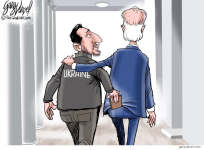Putin supporters formally nominate him as independent candidate in Russian presidential election
Author of the article:Associated Press
Associated Press
Published Dec 16, 2023 • 2 minute read
MOSCOW — Russian President Vladimir Putin ‘s supporters on Saturday formally nominated him to run in the 2024 presidential election as an independent candidate, state news agencies reported.
The nomination by a group of at least 500 supporters is mandatory under Russian election law for those not running on a party ticket. Independent candidates also need to gather at least 300,000 signatures in their support.
The group that nominated Putin included top officials from the ruling United Russia party, prominent Russian actors and singers, athletes and other public figures.
“Whoever is ready to support the candidacy of Vladimir Vladimirovich Putin for the post of president of Russia, please vote. Who’s in favour?” Mikhail Kuznetsov, head of the executive committee of the People’s Front, asked those gathered. The People’s Front is a political coalition, founded in 2011 by Putin.
After the vote, Kuznetsov announced that the group had voted unanimously to nominate Putin.
According to Russian election laws, candidates put forward by a party that isn’t represented in the State Duma or in at least a third of regional legislatures have to submit at least 100,000 signatures from 40 or more regions. Those running independently of any party would need a minimum of 300,000 signatures from 40 regions or more.
Those requirements apply to Putin as well, who has used different tactics over the years. He ran as an independent in 2018 and his campaign gathered signatures. In 2012, he ran as a nominee of the Kremlin’s United Russia party, so there was no need to gather signatures.
At least one party — A Just Russia, which has 27 seats in the 450-seat State Duma — was willing to nominate Putin as its candidate this year. But its leader, Sergei Mironov, was quoted by the state news agency RIA Novosti on Saturday as saying that Putin will be running as an independent and will be gathering signatures.
Last week, lawmakers in Russia set the country’s 2024 presidential election for March 17, moving Putin a step closer to a fifth term in office.
Under constitutional reforms he orchestrated, the 71-year-old Putin is eligible to seek two more six-year terms after his current term expires next year, potentially allowing him to remain in power until 2036.
The tight control over Russia’s political system that he has established during 24 years in power makes his reelection in March all but assured. Prominent critics who could challenge him on the ballot are either in jail or living abroad, and most independent media have been banned.

 torontosun.com
torontosun.com
Author of the article:Associated Press
Associated Press
Published Dec 16, 2023 • 2 minute read
MOSCOW — Russian President Vladimir Putin ‘s supporters on Saturday formally nominated him to run in the 2024 presidential election as an independent candidate, state news agencies reported.
The nomination by a group of at least 500 supporters is mandatory under Russian election law for those not running on a party ticket. Independent candidates also need to gather at least 300,000 signatures in their support.
The group that nominated Putin included top officials from the ruling United Russia party, prominent Russian actors and singers, athletes and other public figures.
“Whoever is ready to support the candidacy of Vladimir Vladimirovich Putin for the post of president of Russia, please vote. Who’s in favour?” Mikhail Kuznetsov, head of the executive committee of the People’s Front, asked those gathered. The People’s Front is a political coalition, founded in 2011 by Putin.
After the vote, Kuznetsov announced that the group had voted unanimously to nominate Putin.
According to Russian election laws, candidates put forward by a party that isn’t represented in the State Duma or in at least a third of regional legislatures have to submit at least 100,000 signatures from 40 or more regions. Those running independently of any party would need a minimum of 300,000 signatures from 40 regions or more.
Those requirements apply to Putin as well, who has used different tactics over the years. He ran as an independent in 2018 and his campaign gathered signatures. In 2012, he ran as a nominee of the Kremlin’s United Russia party, so there was no need to gather signatures.
At least one party — A Just Russia, which has 27 seats in the 450-seat State Duma — was willing to nominate Putin as its candidate this year. But its leader, Sergei Mironov, was quoted by the state news agency RIA Novosti on Saturday as saying that Putin will be running as an independent and will be gathering signatures.
Last week, lawmakers in Russia set the country’s 2024 presidential election for March 17, moving Putin a step closer to a fifth term in office.
Under constitutional reforms he orchestrated, the 71-year-old Putin is eligible to seek two more six-year terms after his current term expires next year, potentially allowing him to remain in power until 2036.
The tight control over Russia’s political system that he has established during 24 years in power makes his reelection in March all but assured. Prominent critics who could challenge him on the ballot are either in jail or living abroad, and most independent media have been banned.

Putin supporters formally nominate him as independent candidate in Russian presidential election
Vladimir Putin 's supporters on Saturday formally nominated him to run in the 2024 presidential election as an independent candidate.





